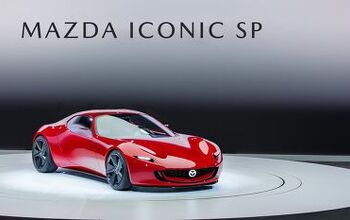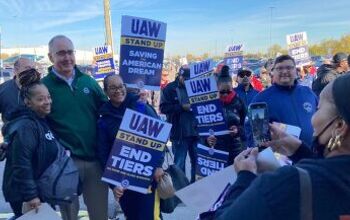Tariffs Would Slam the Jeep Renegade, Force FCA to Weigh Options

Jeeps smallest U.S. offering stands to be hit hard by proposed import tariffs, according to calculations from an investment advisory firm, and the volume of vehicles Fiat Chrysler brings in from outside U.S. borders would see the automaker take it on the chin.
With the Trump administration mulling a range of tariffs, the firm tabulated just how much the import duties could cost FCA. If the tariffs come to pass, expect to see fewer Jeep Renegades on your local dealer lot.
Data from Evercore ISI, published by Automotive News, reveals that a 25-percent tariff on vehicles built outside U.S. borders would cut into FCA’s profits to the tune of $866 million a year. That’s the worst-case scenario.
If instead Trump goes ahead just with his 20-percent tariff on European Union imports, FCA’s loss isn’t as great, but it’s still hefty. $613 million. The bulk of the loss stems from a single model FCA trucks in from Italy — a subcompact, Fiat-based crossover that made up roughly two-thirds of the 158,553 vehicles FCA imported from non-NAFTA countries in 2017: the Jeep Renegade. Last year, Americans bought 103,434 Renegades — a slight decrease from 2016’s volume.
In total, FCA imported 136,827 vehicles from EU nations last year. The entirety of vehicles sold under the Alfa Romeo, Maserati, and Fiat banner also originate outside the U.S., though FCA surely isn’t concerned all that much by the latter brand. Models not hailing from NAFTA countries and the EU include the Fiat 500L, Ram Promaster City, and Fiat 124 Spider.
While a steep tariff would raise the Renegade’s sticker price, FCA has a number of routes it can take to lessen the impact.
“FCA will be examining a variety of options,” said George Galliers, an Evercore analyst. “These could include a push to upsell consumers into NAFTA-sourced vehicles, including the Compass and Cherokee models; keeping the European-sourced Renegade in the market but focusing on higher-specification versions; and looking to source Renegades for the U.S. market from Brazil, where it is also produced, or potentially localizing it in the U.S.”
[Image: Fiat Chrysler Automobiles]

More by Steph Willems
Latest Car Reviews
Read moreLatest Product Reviews
Read moreRecent Comments
- MaintenanceCosts I already set out total costs, so this time I'll list what's had to be done on my cars (not counting oil changes, recall, or free services):2019 Bolt (25k mi): new 12v battery, pending tires & battery cooling service2016 Highlander (from 43k to 69k mi): new front rotors, new pads all around, new PCV valve, 2x 12v batteries, light bulbs, pending tires2011 335i (from 89k to 91k): new valve cover gasket, new spark plugs, light bulbs, pending rear main seal1995 Legend (from 185k to 203k): timing belt/water pump, new EGR valve + pipe, struts, strut bushings, drive axles, tie rods, rear control arms, other suspension bushings, coolant hose & brake lines throughout, belts, radiator, valve cover gaskets, new power antenna, 12v battery, coils, spark plugs, tires, rear pads... it's an old car!
- VoGhost Consistent with CR's data. I've spent about $150 total on the Model 3 in six years of ownership, outside of tires.
- VoGhost It's just plain sad that Posky doesn't know that EV batteries are warrantied for 8 years / 100K miles.
- Jkross22 It used to be depreciation was the most expensive part of car ownership. Seems like those days are over (New EVs and lux cars excluded). Maintenance + insurance have taken over. Dealerships offering 2 years of maintenance means nothing. That's $200 tops. It's the unexpected repairs - a wiring harness, computer module, heater core, AWD problems - that will cost dearly. Brakes can be expensive since many cars now can't have rotors resurfaced. Even independents are charging a lot for this work.
- FreedMike VW tossed in two years' maintenance on my car, and the next one's due after the lease is up. But all the car's needed has been oil changes and tire rotations. Unfortunately, the OEM tires (Hankook Kinergy) were unrepentant trash and needed to be replaced at around 23,000 miles. So...my maintenance cost over over a little under three years has been t $800 for the new tires. That sucks, but the new tires (Goodyear Eagle Sport) are a massive upgrade over the Hankooks. Ah well.



































Comments
Join the conversation
Indeed, any sort of change in the business/economic climate illicits howls of protest. The status quo has great inertia. Thing is, business conditions are always in a state of change. Well managed firms adjust their operations to take advantage of new opportunities and to reduce risk from changing economic conditions. If the stated objective of a tariff is increased domestic employment and production, of course foreign produced product is likely to become more expensive...that is how tariffs work.
Can we seriously get back on topic? None of us are in office anyways to make any decisions so we have to deal with what we get. We can't control President Trump and whether or not anyone likes him as a president, he's still our president that can do whatever he wants -- whether we like it or not. What's ranting on about his decisions going to do? Instead let's look into what the reality might be. Honestly though, reading these comments makes me wonder if anyone here is a mature adult. It's downright ridiculous and embarrassing, and also humiliating. Yeah, you may rebuttal my post about how ridiculous this rant even might be, but come on though, I read these comments with the notion of someone giving insight as to how the prices would effect this Jeep model -- like what the original post is all about -- but instead I find trivial commentary and verbal junk non-relating to what the original author posted. Have some sense. I'm surprised some of you passed English in school. What really is a considerable question is whether or not buying a vehicle like this one, the Jeep Renegade, before his new tarrifs, would effect the price of repairs after his tarrifs got passed. So I'm looking into getting a Jeep -- used, pre-owned or even certified at a Jeep dealership -- before his tarrifs get passed. Now, if I buy a model like the Renegade (for example), and the tarrifs did get passed, would I then have to pay more for repairs since the parts are from out of the U.S. (to my understanding, though I could be wrong) -- is my curiosity? And also, when is the best time to get a vehicle and should it be from either a FORD, GMC, or FCA since they are American brands? If anyone who can answer logically without cynicism and hold a mature conversation, I would appreciate it. And please, just stick to the questions without any immaturity.